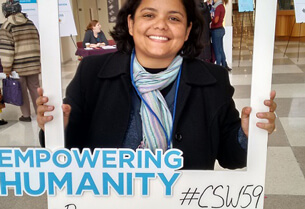
Original article at http://www.anglicannews.org/news
The women, from 17 Communion provinces, are attending events associated with the 59th session of the United Nations Commission on the Status of Women which this year is focussing on a review of the declaration from the Fourth World Conference on Women in Beijing 20 years ago. It is also looking at developing a new platform of action for the future.
The Anglican/Episcopalian delegation is taking part in a programme of UN and parallel events organised in the CSW59 forum for non-governmental organisations under the call, “Planet 50-50 by 2030: Step It Up for Gender Equality.”
Many of the women will visit their permanent country missions at the UN to advocate for the lifting of barriers to women’s active participation in all spheres of public and private life as equal decision-making partners, the core aim of the Beijing Platform for Action.
The women can speak to progress that has been made to implement the Beijing Declaration and Platform for Action in their own contexts – and where there still are gaps.
“Anglican women are present in urban and rural communities all over the world”, said Ann Skamp, convener for the International Anglican Women’s Network (IAWN) who is accompanying the delegation. “They know what is happening at grassroots and bring valuable local knowledge and insights to the table. They also bring the values of their faith and bright hope for the future.
“Whilst there has been considerable progress in many areas, we are now encouraging our governments to accelerate opportunities for achieving gender equality in the post-2015 development agenda,” she said.
Delegation members noted that challenges such as poverty, climate injustice, violence and discrimination, and inadequate resources for education and healthcare had a disproportionate impact on women and girls.
“The number one challenge for women and girls in Swaziland is poverty”, said Revd Dalcy Dlamini, school and university chaplain in the Diocese of Swaziland in the Anglican Church of Southern Africa. “I mean poverty in all its senses – physical, educational and so on. I want to tell people about our culture in Swaziland and how our churches have tried to support the implementation of the Beijing Platform for Action.”
CSW59 also is an opportunity for the members of the delegation to equip themselves for further ministry in their own contexts.
“I hope to use what I learn to help my Church and even my country”, said trainer of teachers Reem El Far from Jordan, co-ordinator of the Ladies’ Committee of the Episcopal Church of Jerusalem & the Middle East. “When I return home I plan to organise intergenerational activities to help engage our younger people in the issues being discussed here.”
The Anglican Communion delegates are from Australia; Hong Kong; Jordan (Jerusalem & the Middle East); Malawi (Central Africa); Myanmar; Papua New Guinea; Aotearoa, New Zealand & Polynesia; Brazil; the Scottish Episcopal Church; Japan; the Church of Ceylon; Swaziland and South Africa; The Episcopal Church; Canada; Ghana (West Africa) and England.
The Episcopal Church (TEC) Center in New York has provided a space of welcome and hospitality for the Anglican Communion delegates alongside TEC’s own church-wide delegation to CSW59.
CSW59 will conclude on Friday 20 March, with the adoption of a political declaration on the occasion of the 20th anniversary of the Fourth World Conference on Women.
Contact for further details: The Revd Terrie Robinson, Director for Women in Church & Society, Anglican Communion Office,terrie.robinson@anglicancommunion.org
In the picture: Tatiana Ribeiro, representative of the Episcopal Anglican Church of Brazil, at CSW59

